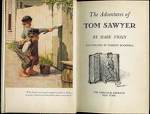
Tom Sawyer, by Mark Twain

Tom Sawyer is the American prototype of the good bad boy. Unlike his friend Huck Finn, a genuine outcast, he is always into mischief but never in real trouble. He is a member of society and shares its values--at the end of the novel, he will not let Huck be a member of his robber gang until Huck agrees to live a respectable life with the Widow Douglas. And despite the mean trick Tom plays on his Aunt Polly, (that is, pretending to be dead so he can attend his own funeral), his place in her family is never in doubt.
Tom Sawyer is episodic and open-ended, as much a series of loosely connected short stories as a novel. Tom plays hooky from school, and, condemned to spend Saturday whitewashing a fence as punishment, tricks his friends into doing it. He wins a prize at Sunday school, not by memorizing Scripture but by trading for the tickets issued to children who did memorize it. He plays pirates and robbers, then gets a taste of the real thing when he sees the outlaw Injun Joe committing a murder. Having fallen in love with Becky Thatcher, he accompanies her on a picnic that her parents give for the village children, and the two get lost in a cave. Finally--a touch without which no boy's adventure book would be complete--Tom and Huck explore the cave again and find the treasure Injun Joe had hidden there.
Tom Sawyer is all innocent nostalgia, a rhapsodic memory piece. Told from an adult's point of view, it is weakest where Twain intrudes and moralizes. At its best, it lacks the seriousness--the constant underlying awareness of the dark side of life--of Huckleberry Finn , its famous sequel. As an unpretentious boyhood idyll it is unsurpassed.